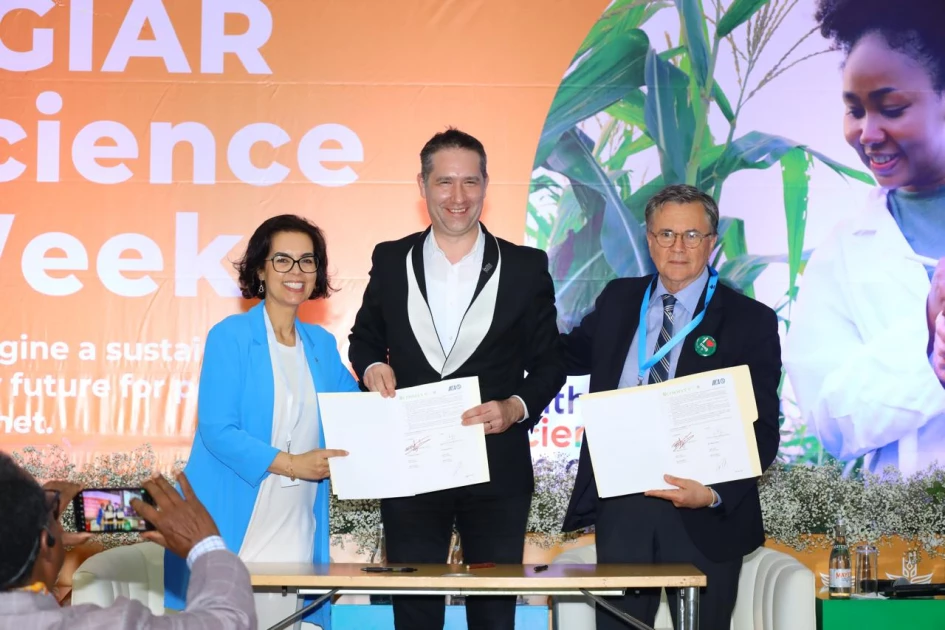CGIAR unveils 2025–2030 research portfolio to transform global food, land, and water systems
Published on: April 08, 2025 01:40 (EAT)

In a world facing escalating agricultural challenges, hunger, and rising inequality, the urgency to transform food systems has never been higher.
In response to these interconnected global challenges, CGIAR launched its 2025–2030 Research Portfolio today at the inaugural CGIAR Science Week in Nairobi.
The new Research Portfolio serves as a strategic blueprint for deploying CGIAR’s pioneering, partner-led science to transform the food, land, and water systems that sustain global food security and planetary health.
Designed not just to adapt to today’s pressing needs but to actively shape a more resilient, equitable, and sustainable future, the new portfolio builds on 50 years of scientific expertise and extensive partner networks. This new phase of CGIAR action is more collaborative, focused, and ambitious than ever before.
Responding to the Agricultural Challenges of Our Time
“Today, I proudly introduce the first-ever research portfolio encapsulating all our Centers’ research: eight science programs, one scaling program, and four accelerators.
But it is more than a set of programs and accelerators — it is a unified platform designed for impact. It reflects our renewed commitment to not only improving productivity but also nutrition security, livelihoods, climate resilience, environmental sustainability, and gender and social equity,” said Ismahane Elouafi, CGIAR Executive Managing Director.
The Research Portfolio is a direct response to global calls for action from world leaders, science experts, and farmers on the front lines of today’s agricultural crises.
Anchored in frameworks such as the United Nations Sustainable Development Goals, the 2025 Paris Agreement, and the Global Biodiversity Framework, the Research Portfolio reflects the reality that today’s food systems can no longer deliver nutrition, equity, or sustainability for our growing populations.
With smallholder farmers in the Global South the hardest hit, the Research Portfolio aims to equip them with the tools, knowledge, and resilience they need to thrive.
“Fifty years ago, we turned to science for solutions,” said Sandra Milach, CGIAR Chief Scientist.
“The CGIAR Centers were created to help farmers produce food, and together with our partners, we have since saved millions of lives in Africa and Asia.
However, the world is different now. We are facing climate change, biodiversity
loss, and new conflicts. Once again, we need to build the capabilities to address these emerging problems. Today, we must develop research that can truly meet these challenges.”
With a global workforce of over 10,000 staff across 80+ countries and a wide network of partnerships, CGIAR is uniquely positioned to coordinate a global response powered by pioneering agricultural science.
The Research Portfolio is organized around science programs focused on critical needs, a Scaling for Impact program to ensure innovations are widely adopted, and accelerators to boost both research and technology uptake. Combined, these components aggregate expertise and partnerships around high-priority targets to deliver scalable solutions that tackle the most pressing global agricultural challenges.
Stakeholders Know Best
A key strength of the Research Portfolio is its collaborative design, developed alongside key stakeholders such as national agricultural research institutions and the farmers themselves.
Through global “Listening Sessions” and consultations with governments,
regional bodies, national research institutions, and local farming communities, CGIAR ensures the portfolio reflects real-world needs and responds to priorities at national, regional, and global levels.
The design also builds on analysis of CGIAR’s cutting-edge innovations and technologies, factoring in current discourse on global agricultural needs and challenges — from shifting diets and demographics to climate volatility and geopolitical shocks. The result is a forward-looking research and innovation agenda that integrates science, policy, and partnerships to achieve lasting impact.
CGIAR’s 2025–2030 Portfolio will benefit food, land, and water systems across low- and middle-income countries (LMICs) by accelerating agricultural productivity growth, leading to better-functioning markets, strengthened livelihoods, and new job and income opportunities for workers in the agrifood system — especially women.
It builds on a solid foundation of existing work while expanding into emerging areas of science with high potential for impact. Ultimately, the portfolio aims to lift hundreds of millions of people out of hunger and poverty, while supporting low-income producers and consumers for decades to come.
Want to send us a story? SMS to 25170 or WhatsApp 0743570000 or Submit on Citizen Digital or email wananchi@royalmedia.co.ke
Comments
No comments yet.



Leave a Comment